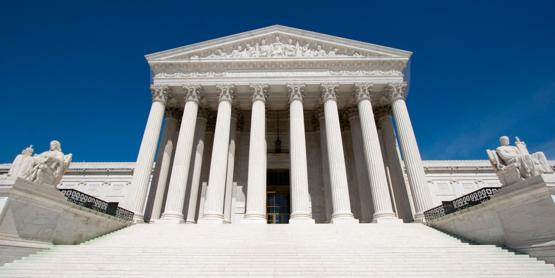SCOTUS Takes on Business, Governments Take on Cash
Here’s What You Need to Know
The Supreme Court’s 2016-2017 term is now underway, and there are several cases that could have big implications for businesses.
Here are a few cases to watch this term:
- How much does a copycat owe? In 2012, a jury ruled that Samsung had infringed on Apple patents by copying the iPhone’s design, and ordered Samsung to pay $548 million in damages. Samsung argues that the current law, which states that the infringer is liable for the total profit made from infringement, goes too far. A group of tech companies, including eBay, Dell, Facebook, and Google filed an amicus brief backing Samsung, arguing the current law could lead to “absurd” results. Other companies, including Calvin Klein, Tiffany & Co., Adidas, and Crocs, filed briefs in support of Apple, arguing that if the court rules that design infringement can be apportioned, it devalues the worth of design and could result in a proliferation of copycat products. If the court rules in favor of Samsung, it could mean marked change in how infringement damages are calculated.
- When can cities sue businesses? The court will decide whether the City of Miami has standing to sue Wells Fargo and Bank of America for alleged lending discrimination, which the city argues drove down city tax revenue and property values while forcing the city to absorb the costs of foreclosed properties. “Banks should be responsible for those consequences,” Miami’s complaint states. The city accused the banks of “disproportionately placing vulnerable, underserved [minority] borrowers in loans they cannot afford.” While the merits of Miami’s claims will not be considered, the court’s ruling could have a dramatic impact on types of law suits that cities can bring against businesses.
- Can a company going bankrupt play favorites among creditors? In Jevic Holding’s bankruptcy, the company used a strategy called structured dismissals that allowed them to pay their bankruptcy lawyers but leave their laid off truck drivers unpaid, even though both had equal standing as creditors. If the lower court’s ruling allowing this strategy stands, it could, according to one lawyer, “threaten the main intent of the Bankruptcy Code, to ensure the fair distribution of assets to creditors.” For their part, nineteen states that filed briefs in the case “are concerned about companies that use structured dismissals to downgrade, or entirely avoid, tax claims.” With such high stakes, the court’s ruling has the potential to change how companies structure bankruptcy payouts and whether creditors can have confidence in a fair process.
News You Can Use
WORLD WAR $
Subscribe to Receive Insights
"*" indicates required fields
There’s a worldwide “war on cash” with national and local governments joining credit card companies in the push for a post-cash world. Brett Scott, author of The Heretic’s Guide to Global Finance: Hacking the Future of Money, says this phenomenon is troubling because a cash-free system creates a world where every transaction becomes a “have your people talk to my people” affair requiring consumers to conform to the automated bureaucracy of intermediaries. Cash-free payment options are unquestionably convenient, but to make them the only form of payment could mean individuals ceding a deceptively large amount of power to those running automated transactions. How governments try to balance innovations in financial transaction with consumer protection should be closely watched in the months and years to come.
ABUSERS GENERAL?
In many states, AG has always stood for “Almost Governor.” But some Attorneys General in a handful of blue states have been going beyond the norm in their attempts to play the role of partisan political activist instead of serving as their states’ chief legal advocate. In New York, Attorney General Eric Schneidermann is leading a sweeping investigation of fossil fuel companies, looking to prove they intentionally misled investors about the dangers of climate change. In California, Attorney General Kamala Harris – currently a candidate for the U.S. Senate – led an investigation into a charter school company that had pushed back against the California Teachers Association’s attempts to unionize their employees. Yet, both of these investigations have yielded no results and have cost millions in taxpayer dollars. In most elected offices, there is an accepted level of politicking. But given the broad investigatory powers and substantial budgets given to Attorneys General, these examples could mark a disturbing trend.
TRUMPED UP TAX REPORTING
This past weekend, The New York Times (potentially illegally) obtained and published three pages from Donald Trump’s 1995 New York state tax return, reporting that Trump declared a $916 million net operating loss (NOL) that year. While the Times painted the loss as an “extraordinary tax benefit” that Mr. Trump “derived from the financial wreckage he left behind,” tax expert Ryan Ellis writes in Forbes that “none of this is unusual in the high stakes investment business Trump plays in.” Political reporters’ ignorance regarding taxes failed to note that a net operating loss is quite common in business, with about 1 million businesses reporting a NOL in 1995. In fact, in 2015, the Clintons realized a $700,000 capital loss, a different type of loss that is even more beneficial for offsetting future tax on capital gains. The political reporters’ and pundits’ attacks on Trump beg some questions beyond the presidential race, according to Ellis: “If this is a ‘loophole,’ what are these political reporters suggesting? That a business loss should simply be eaten by the taxpayer? That Uncle Sam should be a full partner in your profits but not in your losses? How is that fair?”
LOBBYISTS ON BOARD
In the wake of the 2008 financial crisis, regulators created a rule intended to ensure those on corporate boards are free of potential conflicts of interest. It requires that members of a board’s compensation committee must be “independent directors with no financial ties to the company or its executives.” Yet a recent Wall Street Journal review of securities filings and lobbying data found several instances in which board members served as contract lobbyists for the company and oversee CEOs’ compensation, despite the conflict of interest. Such ties, and such mining of public records, show how important due diligence for boards and public affairs teams can be. If you don’t find it, someone else may do it for you – and get it published in The Wall Street Journal.
ALL’S FAIR IN LOVE AND MERGERS
After the headlines announcing a merger or acquisition fade, losing bidders sometimes still try to convince government regulators to scotch the deal. Last Thursday, for example, Salesforce urged EU regulators to probe antitrust issues surrounding Microsoft’s acquisition of LinkedIn, even though the acquisition already won approval in the United States, Canada, and Brazil. Salesforce’s Chief Legal Officer Burke Norton argued in a Medium post that Microsoft’s purchase of LinkedIn will stifle innovation and allow Microsoft to gain an unfair competitive advantage through their collection and sole ownership of LinkedIn’s metadata. Responding to Salesforce’s claims, Microsoft argues the merger will allow them to become competitive in the CRM market that Salesforce currently dominates, ultimately driving down prices. It is a good reminder that the deal is never done until it is really done, and companies must be aware of efforts to disrupt their business plans that may be subject to regulatory approval or other government oversight.
Mark Your Calendars
Sunday, October 9: Second Presidential Debate, Washington University, St. Louis, MO
Wednesday, October 19: Third Presidential Debate, University of Nevada, Las Vegas, NV



